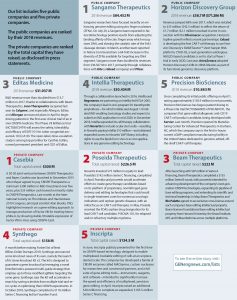
Bayer made much of its desire to establish a cell therapy pipeline on August 8 when it announced it would shell out up to $600 million to acquire full control of BlueRock Therapeutics. But the deal is just the latest example of growing interest by biopharma giants in applying gene editing toward new treatments.
In explaining its CELL+GENE™ Platform on its website, BlueRock speaks of the “convergence of state-of-the-art technologies in cell biology and gene editing,” adding that its “advanced gene-editing capabilities further allow us to engineer these authentic cells to enable new therapeutic modalities.”
Among companies furthest along into gene editing-based therapeutics is Vertex Pharmaceuticals, which in June announced a $2 billion expansion of its presence in the specialty. Vertex is acquiring Exonics Therapeutics for approximately $1 billion, a deal expected to close later in the third quarter, and will spend an additional up-to $1.175 billion to expand a 3½-year-old, potentially $2.5-billion-plus collaboration with CRISPR Therapeutics that has resulted in the first clinical trial of a gene-editing therapy candidate sponsored by U.S. companies.
Biopharma’s apparent growing enthusiasm for gene editing is not shared by Wall Street investors, judging by the declines in stock prices shown by all four companies that have traded shares longer than a year. The extent of the drop-offs depends on the company. CRISPR Therapeutics shares have largely stayed flat, dipping just 1.3% year-over-year, to $48.00 at the close of trading on August 7, compared with $48.64 on August 7, 2018. The shares fell as far as $22.73 on December 21, 2018, before more than doubling over the past eight months.
Shares of Sangamo Therapeutics fell 13% (to $12.17) over the 12 months ending August 7, while Editas Medicine shares declined 15% (to $24.50), and Intellia Therapeutics shares tumbled 38% (to $17.42). Editas and Intellia, like CRISPR Therapeutics, reached 12-month lows on December 21, 2018 before bouncing back, while Sangamo hit its price low point of $7.72 on February 8, a day after the company released disappointing interim results from a pair of Phase I/II trials assessing two of its zinc-finger nuclease (ZFN) genome-editing candidates for two types of mucopolysaccharidosis (MPS).
Yet, venture investors and even some other biopharma giants appear much more optimistic about gene editing–based companies, given the year-over-year increases in total capital raised by many such startups, including those highlighted on this A-List.
The top five private companies together raised a combined $1.041 billion in total capital, up 72% from the $605.5 million raised by the same five companies last year. The top five public companies on this list generated a combined $228.992 million in revenues, up 43% from $159.892 by the five companies ranked in the 2018 A-List (one of which has since been supplanted by a newly public company that jumped from last year’s private company list).
Below is a list of the top 10 companies focused on gene developing and/or applying gene-editing technologies—five public companies, and five private companies. The public companies are ranked by their 2018 revenues, whether from sales of products or services, or from collaborations and R&D activity. The private companies are ranked by the total capital they have raised, as disclosed in press statements. Each company is listed with a short explanation of their recent activity.
The most notable company missing from this year’s A-List is CRISPR Therapeutics, since its reported 2018 revenue (all of it from collaborations) only amounted to $3.124 million, well below the $40.997 million reported in 2017, due to a decline in revenue recognized from the Vertex collaboration ($0.6 million versus $36.2 million in 2017). The 2017 revenue figure included $30.3 million from Vertex toward development of hemoglobinopathy targets, as well as R&D service revenue.
| Public Companies | 2018 revenues | ||
| 5. | Precision BioSciences | $10.883 million | Since completing its initial public offering on April 1, raising approximately $130.9 million in net proceeds, Precision BioSciences has begun patient dosing in a Phase I/IIa trial (NCT03666000) of PBCAR0191, the company’s first gene-edited allogeneic anti-CD19 CAR T-cell product candidate, being developed with Servier. Last month, Precision opened its Manufacturing Center for Advanced Therapeutics (MCAT) in Durham, NC, which the company says is the first in-house current cGMP-compliant manufacturing facility in the U.S. dedicated to genome-edited, off-the-shelf CAR T-cell therapies. Following completion of commissioning, qualification, and validation, MCAT is set to begin cGMP manufacturing in the fourth quarter. |
| 4. | Intellia Therapeutics | $30.434 million | Increases in collaboration revenue from Novartis and Regeneron Pharmaceuticals propelled a 16.5% revenue increase from $26.117 million in 2017. Through a collaboration launched in 2016, Intellia and Regeneron are partnering on Intellia-led NTLA-2001, the company’s lead in vivo program for transthyretin amyloidosis (ATTR)—for which Intellia said August 1 it initiated IND-enabling toxicology studies and expects to submit an IND application in mid-2020. In December 2018, Intellia expanded its cell-therapy collaboration with Novartis to include ocular stem cells—resulting in Novartis paying Intellia $10 million—and obtained expanded access to Novartis’ LNP library, including rights to use the lipids for in vivo or ex vivo applications in any genome-editing technology. |
| 3. | Editas Medicine | $31.937 million | Collaboration and other R&D revenue more than doubled in 2018 from $13.7 million in 2017, thanks to collaborations with Beam Therapeutics, Juno Therapeutics (acquired last year by Celgene), and especially Allergan. Editas and Allergan announced plans in April to begin dosing patients in the first-ever clinical trial of an in vivo CRISPR medicine in the second half of 2019. The Phase I/II Brilliance trial (NCT03872479) will assess the safety, tolerability, and efficacy of EDIT-101 (AGN-151587) for Leber congenital amaurosis 10 (LCA10). The open-label, dose-escalation study is among top priorities for Cynthia Collins, named interim CEO in March and permanent president and CEO on August 6. |
| 2. | Horizon Discovery Group | £58.7 million ($71.286 million) | Revenue jumped 68% over 2017, which was restated to £35 million ($42.5 million) to reflect the return of £1.7 million ($2.1 million) received in error in connection with the Dharmacon acquisition. Horizon’s topline growth reflects recent partnerships: Celyad is developing the first CAR T-cell therapy to use Horizon Discovery’s SMARTvector™ short hairpin RNA (shRNA) technology platform. CYAD-02, a next-generation autologous, NKG2D-based candidate, is set to start a Phase I trial in early 2020 following FDA acceptance of Celyad’s IND in July. Last year, AstraZeneca adopted Horizon Discovery’s Edit-R crRNA libraries as part of its functional genomics discovery platform, while Biocartis’ Idylla™ microsatellite instability (MSI) Assay is supported by cell line-derived reference standards developed by Horizon Discovery. |
| 1. | Sangamo Therapeutics | $84.452 million | Sangamo researchers have focused recently on enhancing genome editing using zinc finger nucleases (ZFNs). On July 29, a Sangamo team reported in Nature Biotechnology positive results from adjusting the binding affinity of the zinc finger array which recognizes DNA, and slowing the catalytic rate of the Fok1 cleavage domain. The two strategies can be combined to enable near-100% on-target modification with no detectable off-targets. In March, another team reported in Nature Communications a 64-fold increase in the diversity of ZFNs available for targeting any DNA segment, after reversing the order of the DNA binding and nuclease domains, and incorporating new linkers enabling base skipping between otherwise adjacent fingers within each ZFN. Sangamo more-than-doubled its revenues from $36.567 million in 2017, primarily through collaborations with Kite (a Gilead company) and Pfizer. |
| Top Private Companies | Total capital raised | ||
| 5. | Inscripta | $134.5 million | In June at the 2019 Synthetic Biology: Engineering, Evolution & Design (SEED) conference in New York City, Inscripta publicly presented for the first time its CRISPR-based technology, designed to enable multiplexed, trackable editing of cells at an unprecedented scale. The company has developed a family of CRISPR enzymes called MADzymes, custom nucleases for researchers and commercial partners, and a full suite of gene-editing tools—instruments, reagents, and software—intended to significantly increase the speed and efficiency of multiplexed, precision gene editing. In April, Inscripta raised an additional $20 million to complete an expanded, $105.5-million Series C financing. |
| 4. | Synthego | $158 million | A month before making Forbes’ list of Next Billion-Dollar Startups 2019, Synthego announced some knockout news of its own, namely the launch of its Gene Knockout Kit v2. The kit is designed to guarantee a gene knockout by leveraging a novel bioinformatics-powered multi-guide strategy that employs up to three modified sgRNAs targeting the same gene. Synthego says the kit will accelerate research by saving scientists from multiple trial-and-error cycles in optimizing their CRISPR experiments. Synthego raised more than two-thirds of its total capital in October 2018, when it completed a $110-million Series C financing led by Founders Fund. |
| 3. | Beam Therapeutics | $222 million | After launching in May 2018 with $87 million in Series A financing and co-founders that included CRISPR pioneer Feng Zhang, PhD, Beam more than doubled its capital in March. The company completed a $135 million Series B round, with proceeds intended for advancing development of next-generation CRISPR technologies, expanding its pipeline of base editing programs, and extending its scientific and technical leadership. In May, Beam and Japanese biotech Bio Palette announced an exclusive cross-license agreement around each company’s base editing intellectual property (IP). Beam licenses foundational base editing IP from Harvard University, the Broad Institute, MIT, and Editas Medicine across multiple platforms. |
| 2. | Poseida Therapeutics | $226.5 million | Novartis Pharma AG invested $75 million in equity to lead Poseida’s $142 million Series C financing, completed in April. Poseida said proceeds would accelerate efforts to create gene therapy candidates based on its platform of proprietary, non-infringed gene delivery and editing technologies that could result in single-treatment cures for numerous oncologic indications and orphan genetic diseases, with an initial focus on CAR-T therapies. In May, Poseida received the FDA’s orphan drug designation for its lead CAR-T candidate, P-BCMA-101, for relapsed and/or refractory multiple myeloma (r/rMM). |
| 1. | Casebia | $300 million | A 50-50 joint venture between CRISPR Therapeutics and Bayer, Casebia draws on CRISPR-Cas9 and expertise of its partners to develop treatments for inherited diseases. Casebia was launched in December 2015 when Bayer agreed to pay CRISPR Therapeutics a minimum $300 million in R&D investment over five years, plus $35 million cash toward a minority stake in CRISPR Therapeutics. Last month at the International Society on Thrombosis and Haemostasis 2019 Congress, principal scientist Alan Brooks, PhD, highlighted research on a gene editing approach to manage production of Factor VIII for treating hemophilia A, by showing stable, titratable expression of Factor VIII in mice using CRISPR-Cas9. |



